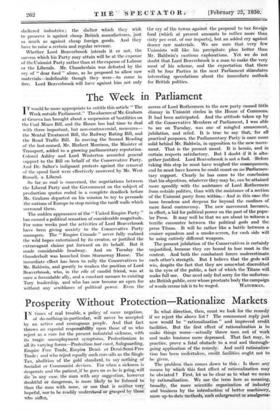The Week in Parliament
IT would be more appropriate to entitle this article " The Week outside Parliament." Theabsence of Mr. Graham at Geneva has brought about a suspension of hostilities on the Coal Mines Bill, and the House has had time to deal with three important, but non-controversial, measures-- the Mental Treatment Bill, the Railway Rating Bill, and- the Road Traffic Bill. In moving the Second Reading of the last-named, Mr. Herbert Morrison, the Minister of Transport, -added to a growing parliamentary reputation. Colonel Ashley and Lord Winterton accorded general support to the Bill on behalf of the Conservative Party. And Dr. Salter's indignant protests against the removal of the speed limit were effectively answered by Mr. West Russell, a- Liberal.
So far; as coal - is concerned, the negotiations between the- Liberal Party and the Government on the subject of production quotas ended' in a complete deadlock before Mr. Graham departed on his mission to try to persuade the nations of Europe to stop raising the tariff walls which surround - them.
The sudden appearance of the " United Empire Party" has caused a political sensation of considerable magnitude. For some weeks past the activities of Lord Beaverbrook. have - been giving anxiety to the Conservative Party- managers. • The " Empire Crusade" never fully realized the wild hopes entertained by its creator, or justified the extravagant claims put forward on its behalf. But it made considerable headway. And • on Tuesday the thunderbolt was launched from Stornoway House: The. immediate -effect has been to rally the Conservatives to Mr. Baldwin, and greatly to weaken the position of Lord. Beaverbrook, who, in the role of candid friend, was at once a formidable ally, and a constant menace to existing Tory leadership, and who has now become an -open foe without any semblance of political power. Even the access of Lord Rothermere to the new party caused little dismay in Unionist circles in the House of Conimons. It had been anticipated. And the attitude taken up by all the Conservative Members of Parliament, I was able to see on Tuesday, was one of mingled amusement, jubilation, and relief. - It is true to -say' that,- for at- practical purposes, the Parliamentary Party is once more solid behind Mr. Baldwin, in opposition to the new move- ment. That is the present mood. it is heroic, and in certain respects satisfactory. But I doubt if it is alto- gether justified. Lord Beaverbrook is not a fool, 'Before taking this step he must have weighed- the consequences, and he must have known he could count on no Varliamen- tary support. Clearly he has come to the conclusion that his objectives, whatever they may be, can-be attained more speedily with the assistance of Lord - Rothermere from outside politics, than with the assistance of a section. of the Unionist party from within r And in this ease -the issue broadens and deepens far beyond the confines of mere fiscal controversy. The new movement becomes, in effect, a bid for political power on the part of the popu- lar Press. It may well be that we are about to witness a terrific encounter between the political gods and the. press Titans. It will he rather like a battle between a cruiser squadron ,and a smoke-screen, for each side will be using entirely different weapons.
The present jubilation of the Conservatives is certainly unjustified, because they are bound to lose most in the. contest. -And both the combatant forces underestimate: each other's strength. But I believe that the gods will win, despite the fact that they are somewhat discredited in the eyes of the public, a fact of which the Titans will make full use. One need only feel sorry for the unfortun- ate British public, over whose prostrate body the campaign of words versus ink is to be waged. WATCHMAN.










































 Previous page
Previous page